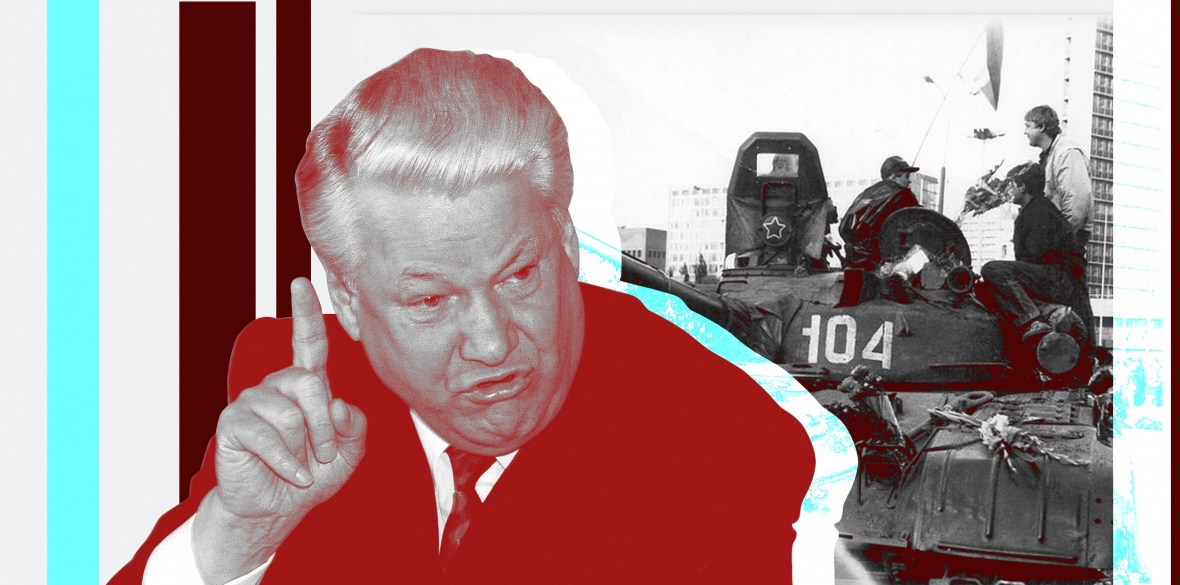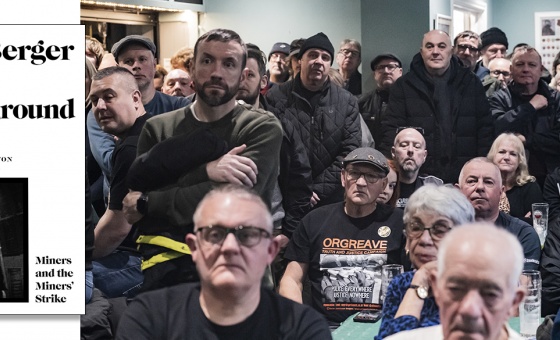This is the last article you can read this month
You can read more article this month
You can read more articles this month
Sorry your limit is up for this month
Reset on:
Please help support the Morning Star by subscribing here
THIRTY years ago today, Mikhail Gorbachev resigned as general secretary of the Communist Party of the Soviet Union (CPSU) and Ukraine’s parliament ended that country’s status as a member of the Union of Soviet Socialist Republics.
It was the beginning of the end of the Soviet Union.
Five days earlier, a faction in the CPSU leadership had revolted against president Gorbachev’s plans to sign a new union treaty to replace the federal but politically centralised Soviet Union.
The proposed Union of Soviet Sovereign Republics — the change of the third word in the title was significant — would retain a common president, currency and foreign and defence policy.
Six former Soviet republics, including the Baltic states and Georgia, had already opted out of the treaty negotiations and voted for full separation.
The treaty recognised this right of secession. Referendums in the other nine republics, including in Russia and Ukraine, had delivered a majority in each for the reformed USSR.
On August 18, a state emergency committee comprising senior state and party officials announced that Gorbachev had been replaced by vice-president Gennady Yanayev.
A six-month state of emergency in selected areas was soon declared, banning strikes, rallies and demonstrations and suspending the activities of political parties and other mass organisations.
Despite the involvement of top KGB and military personnel and the mobilisation of army units, the revolt collapsed.
Opinion among the CPSU, the police, industrial workers and the general public had been sharply divided.
Most wanted to preserve the Soviet Union in some shape or form, but many also feared a return of repressive measures to enforce centralised party rule.
In particular, opposition to the revolt rallied around Russian president Boris Yeltsin, who had defied feeble attempts to arrest him.
A military attack on the Russian parliament was called off after several demonstrators died in clashes.
Soviet and Russian parliamentary leaders seized their opportunity to declare Gorbachev’s removal and the state of emergency illegal and unconstitutional.
Gorbachev returned from house arrest while on holiday, resumed the Soviet presidency but within days resigned as CPSU general secretary.
In reality, whatever power remained in the Soviet Union had passed into the hands of Yeltsin and his “White House” parliament, where power in Russia already lay.
Yeltsin had enthusiastically supported the reform processes of glasnost (“openness”) and perestroika (“reconstruction”), initiated by Gorbachev in the mid-1980s to combat economic and political stagnation.
Centralised planning and control had been weakened, handing powers to individual enterprises and markets.
Increasingly, enterprises were taken over by private foreign or co-operative capital.
Democratic reforms had opened up the mass media, elections, parliament and state and party archives to forces hostile to socialism.
The CPSU proved incapable of effectively fighting this sudden, unplanned “battle of ideas” against free marketeers, separatists and supporters of capitalism and medievalism.
On August 25 1991, Yeltsin’s regime seized all CPSU assets in Russia and four days later he joined his anti-socialist allies in the Supreme Soviet to suspend the party.
The Soviet Union was now disintegrating as Estonia, Ukraine, Moldova and Uzbekistan departed as Georgia had already done.
Naturally, the major Western capitalist powers, politicians and mass media welcomed this outcome.
We were told that freedom had come to peoples of the former Soviet Union.
The end of the cold war would enable humanity to reap a “peace dividend,” with the poor everywhere enjoying the fresh fruits of investment and development.
The US president had already provided a taste of what he called the “new world order” in January 1991 as he launched the first Gulf war.
For anti-Soviet elements in the Western left, the collapse of the Soviet Union heralded a new red dawn.
US intellectual Noam Chomsky likened its downfall to the defeat of Hitler and Mussolini: “A great enemy of socialism has at last collapsed” in what was “a small victory for socialism.”
In Britain, the Socialist Workers Party proclaimed on its paper’s front page: “Communism has collapsed — Now fight for real socialism” (August 31 1991).
Readers were told that this was “a fact that should have every socialist rejoicing.”
Far from celebrating, millions of Russians lost their jobs and livelihoods over the years that followed.
Waves of privatisation slashed economic output by three-quarters, producing mass unemployment and dire poverty.
By 1994, Russian life expectancy had slumped by six years for men and three years for women — an unprecedented peacetime decline for an industrialised country.
By the end of 1994, a new class of oligarchs owned much of the former Soviet economy, many of them ex-state and party officials engaged in wholesale bribery, coercion and theft.
They would soon be joined by emigre capitalists who had made their fortunes abroad.
Perestroika and glasnost had begun as a strategy to modernise, renew and democratise socialism; but they degenerated into a scheme for the restoration of capitalism of a particularly violent and ruthless kind.
The downfall of the Soviet Union represented a historic defeat for the left and socialists across the world.
Former colonies of Western imperialism lost a major ally in their struggle for development free from neocolonial domination.
National liberation movements in Africa and Asia lost a major source of financial, logistical and political support.
Nelson Mandela and Fidel Castro recognised this, even if some Western socialists did not.
Western ideologists and propagandists have been dancing on the grave of the Soviet Union ever since, loudly proclaiming the “end of history” and the “death of communism” — although events from Chile and Cuba to South Africa and China indicate that these obituaries are premature.
Why did the Soviet Union collapse and counter-revolution triumph?
After all, despite its shortcomings and some enormous mistakes — notably the repression of millions of innocent citizens, including many communists, in the late 1930s — the Soviets had overcome imperialist invasions, civil war, sabotage, Nazi-led destruction and Western embargos to transform the lives of most of their people fundamentally for the better.
The world must never be allowed to forget how the Soviet Red Army and people fought and sacrificed to save the peoples of Europe from Nazi barbarism.
After World War II, the Soviet economy grew faster than those of the US and western Europe until the end of the 1960s.
After falling a little behind in the 1970s, although still outstripping Britain, it expanded faster than most countries of western Europe — including West Germany — until the mid-1980s.
Enormous improvements were made to people’s lives in the Soviet Union, not only in education, health, employment, housing and social welfare but also in their access to leisure, sport and culture.
While economic problems of technological application, incentive, productivity, quality and environmental degradation were accumulating, they were not insurmountable with the right structural reforms (including a shift of resources from the military to civilian sectors).
Yet there was not the culture of free discussion, innovation and mass participation in decision-making — whether in the CPSU, in parliaments, workplaces or education — to identify, address and remedy those problems.
The CPSU grew apart from the people, relying on a bureaucratic-command system of state power to carry out decisions which too often were the product of dogma, routine and conformity.
An important aspect of this was the state and party’s failure to implement a thoroughly Leninist nationalities policy.
The rights of nations to self-determination and governmental autonomy were seriously violated on occasion, with the collective punishment of whole peoples.
The Great Russian chauvinism warned against by Lenin did much — with the assistance of outside forces — to foment division and separatism.
In the end, as the prospect of counter-revolution emerged, far too many Soviet citizens felt that the socialist system was not theirs to defend.
CPSU members outnumbered Marxist-Leninists, the genuine communists with a firm commitment to the working class, to the people and to socialism.
How else to explain the decision of the state emergency committee on August 19 1991, to ban strikes, rallies and demonstrations rather than calling on the working class to mobilise to defend the Soviet Union?
In the 21st century, the international communist movement still has much to learn from the past in preparation for the next socialist revolution.
At the same time, the great achievements of the Soviet Union should be proclaimed, defended and celebrated.
Robert Griffiths is general secretary of the Communist Party of Britain.









